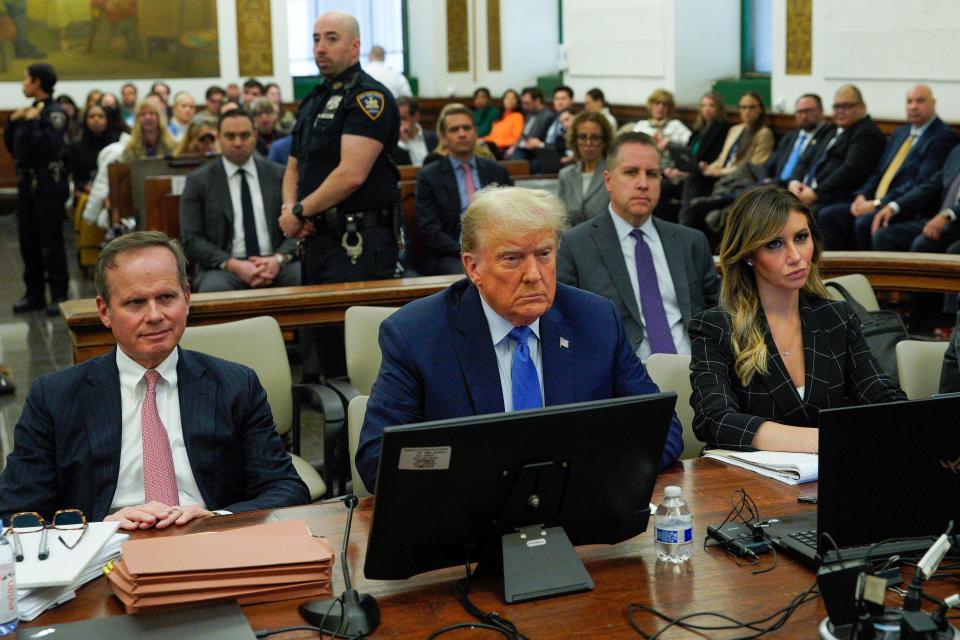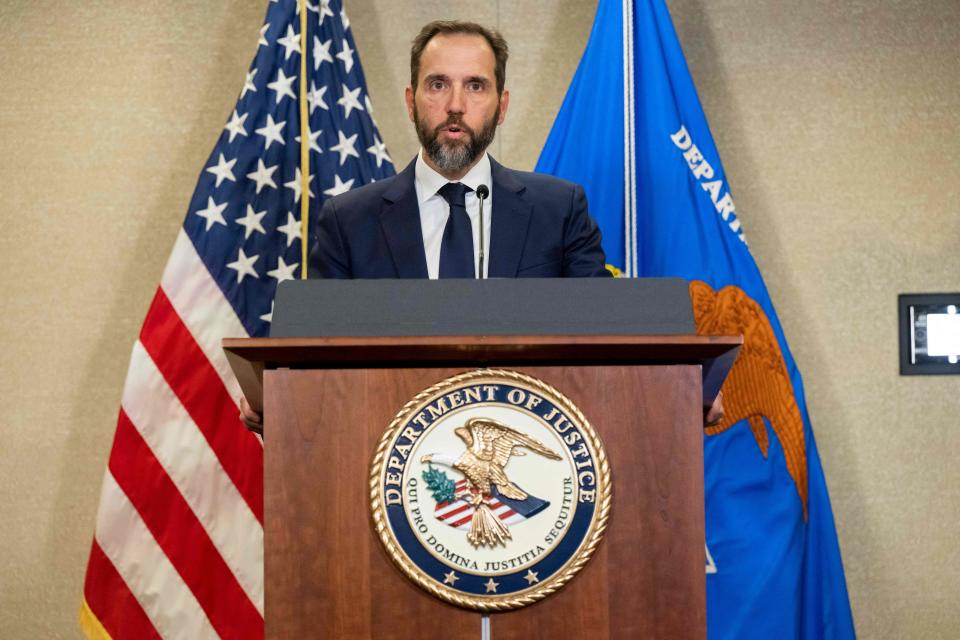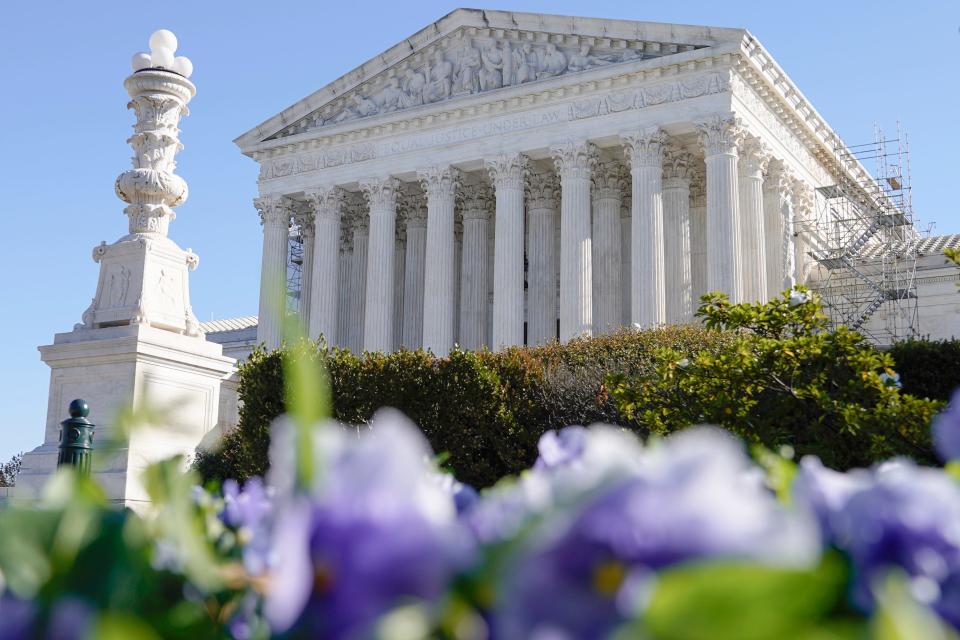Special Counsel Jack Smith asks Supreme Court to weigh Trump's immunity: What to expect
- Oops!Something went wrong.Please try again later.
- Oops!Something went wrong.Please try again later.
WASHINGTON − The question for the Supreme Court is whether former President Donald Trump can claim immunity from criminal charges stemming from his alleged interference in the 2020 election.
The question for everyone else: How soon will the Supreme Court decide?
Special counsel Jack Smith's unusual appeal to the nation's top court Monday is largely about timing. Smith is hoping the Supreme Court will resolve the questions swirling around Trump's immunity claims so that a lower court can stick to its March 4 trial date − or at least not blow past that date significantly.
Under normal circumstances, the Supreme Court moves at glacial speed. But there are signs the justices may pick up the pace for this appeal, given the enormous consequences at stake. Here's a look at how that might work.

Who is Jack Smith?
Attorney General Merrick Garland named Jack Smith last November to oversee the politically fraught investigations into Trump. Smith, a career prosecutor, has secured indictments against the former president twice. One case involves the alleged mishandling of classified documents. The other, the one at issue now at the Supreme Court, deals with allegations Trump attempted to overturn the results of the 2020 election.
What is the case against Trump about?
The charges against Trump are tied to a basic allegation that he spread claims of election fraud he knew were false and pursued unlawful avenues to subvert the election results. The former president has pleaded not guilty, and said in a court filing that he "emphatically denies the truth of any allegations in the indictment."
But before the lower courts can get to those underlying issues, they must first resolve the immunity question. If the Supreme Court finds that Trump has immunity, it would likely end Smith's case.
Trump is also facing state criminal charges in Georgia tied to his alleged interference in the 2020 presidential election. There, prosecutors have charged Trump and several others with participating in a multipronged conspiracy to overturn the results, including by interfering in Georgia's election processes. Some co-defendants have already accepted plea deals in that case.
What is the meaning of presidential immunity?
Relying in part on a 1982 Supreme Court decision that found presidents have immunity from civil lawsuits in some contexts, Trump has argued that immunity also extends to criminal claims. A federal judge in Washington smacked the novel theory down in a ruling against Trump this month.
"Whatever immunities a sitting president may enjoy, the United States has only one chief executive at a time, and that position does not confer a lifelong 'get-out-of-jail-free' pass," U.S. District Judge Tanya Chutkan wrote on Dec. 1. "Former presidents enjoy no special conditions on their federal criminal liability."
Trump appealed to the U.S. Court of Appeals for the District of Columbia Circuit, a move that both sides have said froze action in the lower court as the clock ticked toward a March 4 trial date.
A separate legal battle involving Trump is underway over presidential immunity in civil cases.

What does Smith want?
Sensing a fight that could take months to resolve and delay Trump's trial, Smith went directly to the Supreme Court on Monday in an attempt to leapfrog the appeals court. The special counsel asked the justices to decide whether Chutkan was right about immunity and to hurry it up.
Will the Supreme Court fast track Trump's case?
Maybe, but first the Supreme Court must decide if it will decide the issue at all.
When an appeal arrives at the Supreme Court, the parties sometimes spend months filing briefs back and forth to help the justices decide whether they will grant the appeal or deny it. The vast majority of appeals are denied. It takes four justices to agree to hear a case for a grant.
Normally, a respondent gets a month to file a brief opposing an appeal. Late Monday, the top court agreed to speed up that part of the process, at least. In Trump's case, the Supreme Court ordered the former president to respond to Smith's appeal by Dec. 20, a little over a week.
Once all the briefing is in, the Supreme Court will decide whether to grant the case, which would kick off a new round of briefing and oral arguments.

Will Trump's case go to trial before the 2024 election?
It's the question everyone would like to have an answer to.
Typically, the court takes weeks to schedule a case for arguments and months for a decision after arguments. For instance, the court granted an appeal on Friday that had been initially filed in July. It is unlikely to hear arguments in that case until the spring.
Another factor that may have influenced Smith's decision to file his appeal the way he did: The Supreme Court is already rounding out is roster of cases for the 2023-2024 term. In other words, it has already granted nearly enough appeals to fill out its argument calendar through next spring. If Smith can't get the immunity question before the justices now, he might have to wait until the court returns to work in October 2024.
That, of course, would be a month before the presidential election.
Smith noted that there is precedent for hurrying things up, including in cases dealing with presidential power. In 1974, the top court moved quickly to required President Richard Nixon to turn over audio recordings he had made in the Oval Office as part of the Watergate investigation. Smith cited the case in the brief, noting that the court granted the appeal a week after it was filed and decided the matter within 16 days.
What happens if the case is pending and Trump is elected?
If the various legal cases against Trump are still pending and the former president is elected in 2024 it would once again thrust the nation into uncharted legal territory. Trump has repeatedly claimed that the charges are politically motivated, and he would likely appoint an attorney general who would seek to dismiss the federal cases. Less certain is what might happen with the separate election case unfolding in a state court in Georgia.
Dig deeper: In 'extraordinary' move, prosecutors ask Supreme Court to decide if Trump may claim immunity
Contributing: Aysha Bagchi
This article originally appeared on USA TODAY: As Supreme Court weighs Trump immunity case, what to expect

